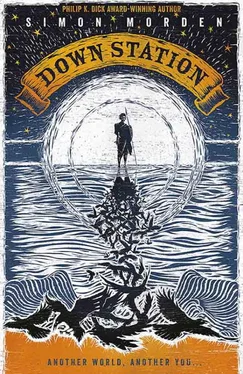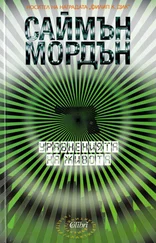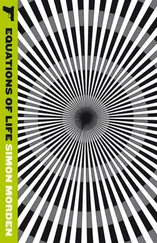Simon Morden
DOWN STATION
For G, who hates this sort of thing
If you want a map, you must draw it yourself and keep it secret.
Mary looked at the watches in the window with an emotion that swung like a metronome between wonder and envy. They were beautiful, glittering bright with polished metal and inset jewels, and they were so very expensive. They shone like the sun, and they belonged on her skinny wrist. The work that had gone into just that one with the silver-steel bevel and the three separate dials must have been incredible, and no matter how many hours she worked, however hard she saved, she’d never be able to afford it in her lifetime.
The price tag was almost incomprehensibly high, as if whoever had written it out in fine, precise figures, had daydreamed away and added too many zeros. It had to be a joke; an obscene joke, even, aimed right at her. She wasn’t laughing.
A hand came out from behind the display to snag the stand. As the watches retreated, Mary could see into the shop beyond. Tall glass cabinets with black velvet squares that showed off the clarity and colour of the gems, the coolness of the platinum, the warmth of the gold. Blond wood on the floor. Rich red on the walls. Lights. Lights everywhere.
She was about to turn away into the night when she accidentally caught the eye of the woman dismantling the window display. For a moment, the immaculately made-up face, powdered and shadowed and lipsticked, froze, taking in Mary’s scruffy Puffa jacket and scraped-back coils of black hair, her dark eyes and the acne scars on her cheeks.
And for a moment, rather than scorn or derision, a slight, secret smile and a rise of an artificially arched eyebrow. Neither of them could possibly afford to shop there. Then she turned her head◦– a voice, calling from somewhere unseen◦– and she hurried away towards the back room.
Mary imagined the clacking the woman’s stiletto heels would make on the floor, the soft smell of a floral perfume, the whisper of material as stockings brushed against a tight pencil skirt. She imagined the woman’s boss, paying her a pittance and using her beauty to sell beautiful things.
Her fingers, buried deep in the pockets of her jacket, curled involuntarily into fists. A brick wouldn’t break these windows, thick and laminated. And even if it did, and she grabbed a watch in the second before the alarms went off and the street behind her filled with blue flashing lights, and somehow she avoided immediate capture◦– what would she do with it? She couldn’t possibly wear it, and fencing it would leave her with, at best, a few quid in her pocket because the property would be red hot.
She’d be better off lifting something with a plastic strap from a display in a department store. More her style. More in keeping with her budget.
However: she had faithfully promised the magistrate she wouldn’t do that again, because she had a job now, and was taking responsibility for her life, just as her solicitor and her probation officer had told her to say. It was a promise that, to everyone’s surprise, including hers, she’d kept for nine weeks now, along with the job they’d got her.
She hadn’t had to take it. She could have told them to stick it◦– except that everyone was expecting her to, and that, perversely had made her jut her chin and say she’d do it. It had probably been the deciding factor in keeping her out of Holloway.
Mary turned from the window and the dazzling reflections of light. The street, though busy with black taxis and red buses, late-night theatre goers and rich kids, seemed dark and mean. It didn’t help that the sky was so low: bulbous clouds descended almost to the rooftops, pregnant with rain, turning the harsh sodium glare a deeper red.
From away over Richmond, the first growl of thunder reached Leicester Square. For a moment, the sound stilled every other noise. People looked up, realised they were unprepared for a downpour, and contemplated their choices.
By the time Mary finished her shift, it would be morning and the storm would have blown over. She’d walk all the way back, tired and dirty, to her hostel along the freshly washed pavements. But still, inexplicably, despite everything, free. Not exactly free: she had regular meetings with her probation officer, a wispy thing called Anna who didn’t seem at all afraid of her, and then there was her Anger Management course, which wasn’t a surprise in the slightest, and her supervisor at work who would rat her out in an instant if she didn’t turn up on the dot.
But free all the same. There were compensations to working for the Underground. The other◦– aside from not being banged up for twenty-three hours a day, or whatever the current regime demanded◦– was the people she worked with.
It was like clocking in with the United Nations every day, but she was a London girl and fine with that, though some of the accents were difficult◦– not just at first, either. Supervisor aside, and he really was a prime piece of shit, the rest of the crew didn’t seem to mind her past, or her future for that matter. All that counted was whether she pulled her weight in the now.
She lugged her heavy bag across the road against the flow of traffic, towards the tube entrance. Another low boom echoed from the west, and the waverers decided against stopping for that last drink, heading for the stairs too.
When they pushed past her, running and talking too loudly for the confines of the concourse, she had her mouth open and an insult balanced on the tip of her tongue.
She checked herself, as she’d been taught: her breathing was fast and shallow, and inside she felt the cold rush of rage. Those that worked with her had lots of fancy names for it, but none of the labels meant anything to her, except a single off-hand comment that she seized on. The Red Queen was the one she recognised and owned: the terrible desire to give orders, to be obeyed, was deep inside her. Yet she knew she’d never be in charge of anything, let alone be a queen.
She counted to ten, and hoisted her bag back on to her shoulder. By then, they were gone, voices muffled in the depths. They were jerks. They probably hadn’t even seen her. She was better than to rise at their carelessness. She took a deep breath, and carried on.
She had a pass: a proper pass that she’d had to sign for, that carried her photo◦– God, she hated it because it made her look like this weird child-thing◦– that allowed her to access almost everywhere and everything. Losing it would mean instant dismissal. Losing it and not telling anyone she’d lost it would be enough to land her inside. They may as well have printed her details on a gold brick instead of a laminated piece of plastic, for all they went on about ‘the integrity of the system’.
The ticket hall was all but empty. A couple of stragglers tripped down the stairs from another entrance, stumbling and looking back the way they’d come, then hurried on to the barriers, wallets already out and in hand.
She followed them, touching in on the pad. The gates banged back, and she twisted to get her bag through.
Then it was the long ride down the escalator, down to the deep levels where it was hot and humid, and ever-so-slightly foetid. The advertising panels flickered their wares at her, five-second looped images, discordant and bright: enough to catch her attention and slam a message into her eyes, but not enough to seduce or explain.
One was for a holiday. How long was it since she’d had a holiday? They’d had day-trips from the home that had been, to quote one of the staff, a logistical nightmare. One of the other members of staff had said it was more like herding cats. It had been Southend, usually, and Eastbourne once.
Читать дальше

![Саймон Морден - Билет в никуда [litres]](/books/388091/sajmon-morden-bilet-v-nikuda-litres-thumb.webp)
![Саймон Морден - Билет в один конец [litres]](/books/395533/sajmon-morden-bilet-v-odin-konec-litres-thumb.webp)









